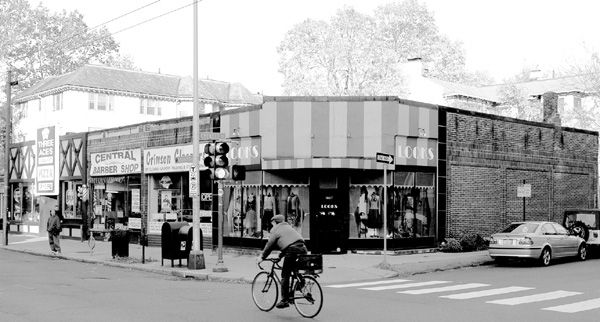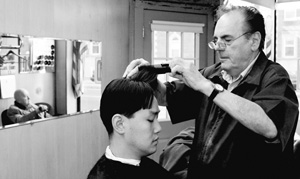Zoning change spares avenue retail

The so-called Bence site, at Mass Avenue and Everett Street, sits amid Harvard University property and faces an uncertain future as the school expands. A change in zoning laws would protect retail on the ground level of the avenue, although it would not necessarily protect the businesses at the site in the fall of 2005. (Photo: Schuyler Pisha)
With looming growth of Harvard and Lesley universities giving its actions a special edge, the city’s Planning Board has proposed a change in zoning laws between Harvard Square and the Alewife Brook Parkway to keep retail business on Massachusetts Avenue.
It came after exhaustive discussion with neighborhood groups, who say they are “a little bit happy.”
“But they didn’t go far enough,” said David Reed, of the Porter Square Neighborhood Association.
Reed wants assurance that first-floor store space will remain, even if the building it is in changes hands or is torn down.
The uses at the Bence site — which holds businesses such as the Three Aces Pizza House and Looks women’s clothing but is named for a long-gone pharmacy — are an example of what could be protected by the change. The businesses are on Harvard land and between existing Harvard properties, and the university is planning a law school expansion. Three Aces, a neighborhood institution, holds only a two-year lease.
Reed said he and his neighbors love these “quirky little shops” along Massachusetts Avenue and don’t want these types of businesses destroyed by big developers’ housing projects. The board’s proposal goes some distance toward ensuring they’re not.
The amendment contains a list of objectives that include “encouraging a wide diversity of building forms and uses” and present an “interesting public face.”
It also says it is intended to preserve the remaining wood-framed freestanding buildings, which reflect the avenue’s past as a residential street and, “to the extent possible, encourage enterprises that serve the needs residents in adjacent neighborhoods and university populations.”

Fred Iannacone, owner of Central Barber Shop, gives a haircut to a local student. The barber shop has been at 1611 Massachusetts Ave. in Cambridge since 1926, when the building was first erected. Iannacone has been leasing the shop since 1965. Iannacone said Nov. 3, 2005, that while Harvard University has assured him he will be compensated if the shop has to move, he remains concerned about the future. (Photo: Schuyler Pisha)
City officials such as Stuart Dash, director of community planning, say the purpose of the entire 10-page amendment comes down to one thing: “managing growth.”
One of several ways to do that is to provide incentives for developers to put in residential buildings that have a retail shop on the avenue’s ground level.
In the Massachusetts Avenue Overlay District, there is an elaborate calculation for how big a developer can build.
The regulations would remove the front 40 feet deep of the store and multiply it by its width. In other words, a 100-foot-wide building that goes back 40 feet from the front of the store would have 4,000 square feet forgiven — allowing a developer to add 4,000 feet bigger.
Reed said he doesn’t like that incentive because developers might be encouraged to “tear down the one story to put in two. Now the whole character along the avenue has changed.”
But he was on board with the overall objective of the regulation changes that are intended to maintain business activity, he said.
He said the regulation should have language that makes it clear that a building with a retail and residential past can put the retail back at any point.
“We want it to say that developers have as much 50 years to put retail back,” Reed said. “That’s all we want.”

